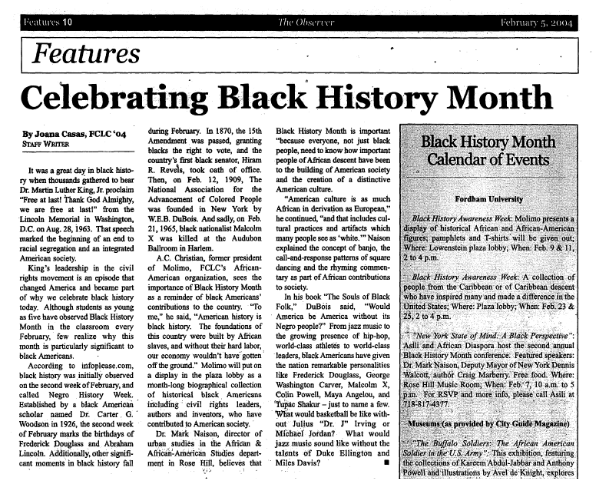
THE OBSERVER ARCHIVES
“Celebrating Black History Month”
From Features
By Joana Casas, FCLC ‘04
Staff Writer

“American history is black history. The foundations of this country were built by African slaves, and without their hard labor, our economy wouldn’t have gotten off the ground.” – A.C. Christian, former president of Molimo
It was a great day in black history when thousands gathered to hear Dr. Martin Luther King, Jr. proclaim “Free at last! Thank God Almighty, we are free at last!” from the Lincoln Memorial in Washington, D.C. on Aug. 28, 1963. That speech marked the beginning of an end to racial segregation and an integrated American society.
King’s leadership in the civil rights movement is an episode that changed America and became part of why we celebrate black history today. Although students as young as five have observed Black History Month in the classroom every February, few realize why this month is particularly significant to black Americans.
According to infoplease.com, black history was initially observed on the second week of February, and called Negro History Week. Established by a black American scholar named Dr. Carter G. Woodson in 1926, the second week of February marks the birthdays of Frederick Douglass and Abraham Lincoln. Additionally, other significant moments in black history fall during February. In 1870, the 15th Amendment was passed, granting blacks the right to vote, and the country’s first black senator, Hiram R. Revels, took oath of office. Then, on Feb. 12, 1909, The National Association for the Advancement of Colored People was founded in New York by W.E.B. DuBois. And sadly, on Feb. 21, 1965, black nationalist Malcolm X was killed at the Audubon Ballroom in Harlem.
A.C. Christian, former president of Molimo, FCLC’s African-American organization, sees the importance of Black History month as a reminder of black Americans’ contributions to the country. “To me,” he said, “American history is black history. The foundations of this country were built by African slaves, and without their hard labor, our economy wouldn’t have gotten off the ground.” Molimo will put on a display in the plaza lobby as a month-long biographical collection of historical black Americans including civil rights leaders, authors and inventors, who have contributed to American society.
Dr. Mark Naison, director of urban studies in the African & African-American Studies department in Rose Hill, believes that Black History Month is important “because everyone, not just black people, need to know how important people of African descent have been to the building of American society and the creation of a distinctive American culture.
“American culture is as much African in derivation as European,” he continued, “and that includes cultural practices and artifacts which many people see as ‘white.’” Naison explained the concept of banjo, the call-and-response patterns of square dancing and the rhyming commentary as part of African contributions to society.
In his book “The Souls of Black Folk,” DuBois said, “Would America be America without its Negro people?” From jazz music to the growing presence of hip-hop, world-class athletes to world-class leaders, black Americans have given the nation remarkable personalities like Frederick Douglass, George Washington Carver, Malcolm X, Colin Powell, Maya Angelou, and Tupac Shakur — just to name a few. What would basketball be like without Julius “Dr. J” Irving or Michael Jordan? What would jazz music sound like without the talents of Duke Ellington and Miles Davis?